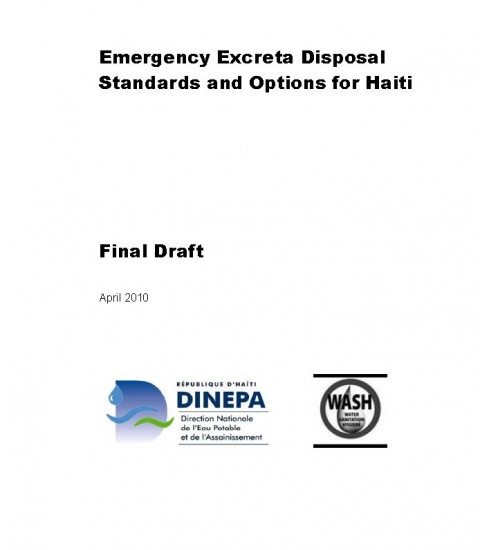
Published in: 2010
Publisher:
Direction Nationale de l'Eau Potable et de l'Assainissement (DINEPA) & Global WASH Cluster
Author:
Reed, B.
Uploaded by:
SuSanA secretariat
Partner profile:
common upload
6829 Views
119 Downloads
Location of library entry
Content - Summary
A magnitude 7.0 earthquake, the strongest ever recorded in Haiti, struck at 4:53 local time on Tuesday January 12th causing widespread destruction. A further earthquake reported at over 6.1 occurred on the morning of the 20th January. Already weak water and sanitation systems have been badly damaged, leaving populations of entire districts deprived of basic services. By April 2010, despite the efforts of the Government of Haiti, the UN and international and national NGO’s, many temporary camps were still without adequate sanitation facilities. With the imminent onset of the rainy season, there was grave concern that the lack of adequate facilities would lead to a major outbreak of excreta related disease.
This document was commissioned in order to provide an overview of the most important emergency excreta disposal options and standards for Haiti. The primary aim was to help standardize excreta disposal technologies and practices, and support new organisations entering
the sector. The document concentrates on the issues of toilet design, excreta storage and treatment as these are the most challenging problems. However a section on hand washing is also included as it is an important element in toilet design and user hygiene. This document does not
intend to be an extensive “how to” manual. Rather, technical options have been briefly presented to help the reader decide on the best approach to use and “steer” them to the most appropriate references if required. It is envisioned that this document will be a useful reference to all future
emergencies in Haiti.
Bibliographic information
Reed, B. (2010). Emergency excreta disposal standards and options for Haiti. Direction Nationale de l'Eau Potable et de l'Assainissement (DINEPA) & Global WASH Cluster
Filter tags
Emergency and reconstruction situations (WG8) English Guidelines and manuals Latin America & Caribbean Practitioners Urban informal settlements (slums)















